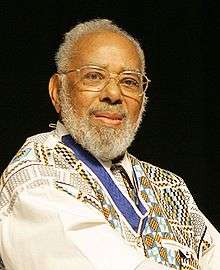Abdias do Nascimento
| Abdias do Nascimento | |
|---|---|
 Abdias do Nascimento | |
| Born |
March 14, 1914 Franca |
| Died |
May 24, 2011 (aged 97) Rio de Janeiro |
| Occupation | Brazilian politician |
Abdias do Nascimento (March 14, 1914 – May 23, 2011[1]) was a prominent Afro-Brazilian scholar, artist, and politician.[2]
Biography
| Part of the Politics series on |
| Pan-African Topics |
|---|
 |
|
People
|
|
Born in Franca, São Paulo state, Nascimento attended public school as a child and joined the military in 1930, but was discharged for disorderly conduct a few years later.[2] He received a B.A. in Economics from the Federal University of Rio de Janeiro in 1938, and graduate degrees from the Higher Institute of Brazilian Studies (1957) and the Oceanography Institute (1961). Nascimento travelled South America with a group of poets calling themselves the "Santa Irmandad Orquidea", or the "Holy Brotherhood of the Orchid", and developed an interest for the dramatic arts. Returning to Rio de Janeiro, he founded the Black Experimental Theater (Teatro Experimental do Negro, TEN) in 1944.[2] He performed in Orfeu da Conceição, a play by Vinicius de Moraes that was later adapted into the motion picture Black Orpheus. He became a leader in Brazil's black movement, and was forced into exile by the military regime in 1968.
Life in exile
From 1968 to 1981 Nascimento was very active in the international Pan-African Movement and was elected Vice-President and Coordinator of the Third Congress of Black Culture in the Americas. For the next decade Nascimento was a visiting professor at several universities in the United States, including the Yale School of Drama (1969–1971), and University at Buffalo, The State University of New York, where he founded the chair in African Cultures in the New World, Puerto Rican Studies Program in 1971.[2] He held the position of Professor Emeritus at SUNY-Buffalo. Nascimento also taught at the University of Ife (now Obafemi Awolowo University) in Nigeria.[2]
Return to Brazil
Nascimento returned to Brazil in 1983 and was elected to the federal Chamber of Deputies as a member of the Democratic Labour Party (PDT). There, his focus was supporting legislation to address racial problems. In 1994 he was elected to the Senate and served until 1999. In 2004 he was nominated for the Nobel Prize for Peace. A biography of Nascimento by the journalist Sandra Almada was published in 2009 as part of the Retratos do Brasil Negro series.[2]
Nascimento suffered from diabetes and died on 23 May 2011, in Rio de Janeiro, due to cardiac arrest.[3][4]
Selected publications
- "Africans in Brazil: a Pan-African perspective" (1997)
- "Orixás: os deuses vivos da Africa" (Orishas: the living gods of Africa in Brazil) (1995)
- "Race and ethnicity in Latin America – African culture in Brazilian art" (1994)
- "Brazil, mixture or massacre? Essays in the genocide of a Black people" (1989)
- "Sortilege" (black mystery) (1978)
- "Racial Democracy in Brazil, Myth or Reality?: A Dossier of Brazilian Racism" (1977)
Filmography
- Cinema de Preto (2005)
- Cinco vezes Favela (1962)
- Terra da Perdição (1962)
- Homem do Sputnik, O (1959)
References
- ↑ Bruce Weber (May 30, 2011). "Abdias do Nascimento, Rights Voice, Dies at 97". The New York Times.
- 1 2 3 4 5 6 Lopes, Nei (2015). Dicionário escolar afro-brasileiro (in Portuguese). São Paulo: Selo Negro. p. 13. ISBN 9788587478955.
- ↑ Death of Abdias Nascimento Archived May 27, 2011, at the Wayback Machine. (in Portuguese)
- ↑ Obituary in USA Africa Dialogue Series: "In Memoriam for Abdias do Nascimento 1914–2011" by Molefi Kete Asante
External links
- Joseph A. Page (1995), The Brazilians. Da Capo Press. ISBN 0-201-44191-8.
- Abdias do Nascimento; The Only Brazilian That I'm Proud Of! (biography)
- Biography
- IPEAFRO site on Nascimento
- Abdias do Nascimento at the Internet Movie Database